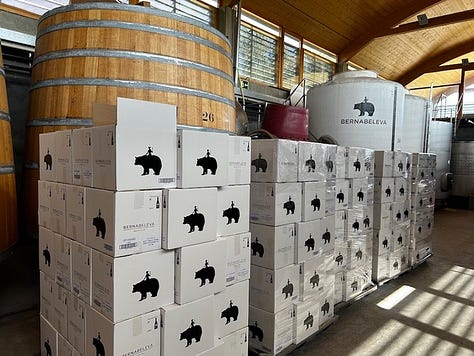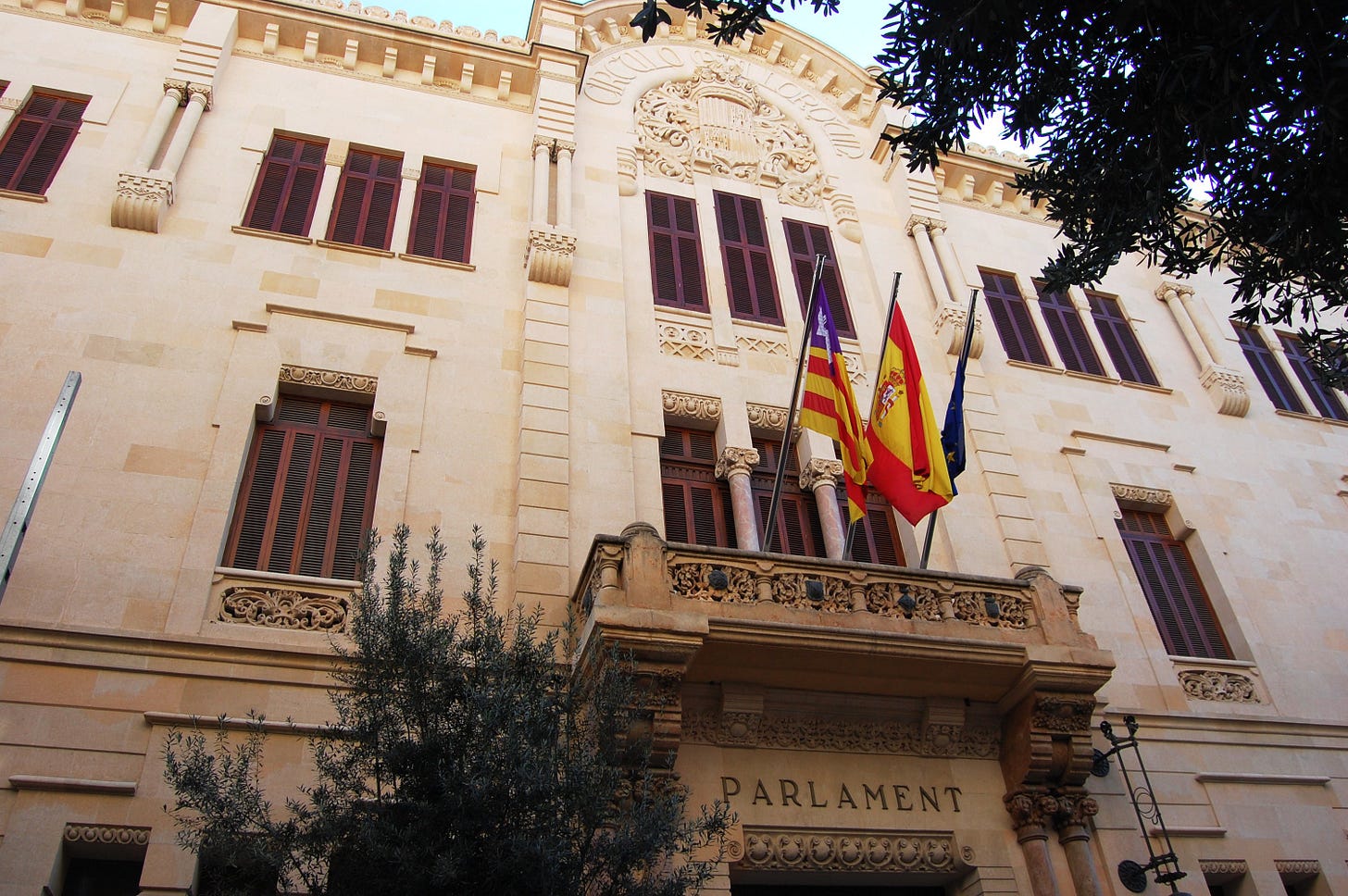🚅 Spain's Great Train Robbery
Plus: Salvame is back! (sorta) and blackouts can't stop Spanish spenders.
Madrid | Issue #101
🇪🇸 The Bubble is Spain's #1 English-language newsletter. We offer paid subscriptions and we’d be thrilled to have your support!
Can’t get there from here
Copper Theft in Spain Happens Mainly on the Train
Spain really had a lot on last week. A historic blackout. Then a national holiday. Then a Madrid holiday to celebrate rising up against the French invaders (and losing). And the cherry on the top? A massive train outage Sunday that stranded over 10,000 people. Who says Spain doesn’t know how to have fun? (No one says that, actually.)
The news. On Sunday, just six days after the blackout stranded 35,000 train passengers, the theft of copper wiring along the tracks at five spots in the towns of Los Yébenes and Manzaneque (Toledo) on the Madrid-Sevilla line affected 10,700 passengers on 30 trains that suffered hours-long delays or were canceled. Making it all worse, a train from Iryo (an Italian competitor to Renfe) had a problem with overhead electrical wires along the same line. Bad luck!
Why so many? Many Madrileños were returning after taking advantage of the four-day holiday to go to the beach, while others were heading to Sevilla to enjoy this week’s Feria (if you don’t know what that is, check out our Instagram guest!).
A theft? So what? That’s the thing. Stealing copper—from trains, businesses, abandoned buildings—is a pretty common crime. It pays €4-6/kilo, according to El Español, and some Eastern European gangs apparently specialize in it.
Blame game. But because no one knows exactly what happened, Spain’s political parties started to speculate, and blame each other. Remember last week’s Gran Apagón? Just like that. So here’s a new episode of Who Needs Facts When You’ve Got Opinions?
Transport Minister Oscar Puente kicked it off Sunday night, when he posted on X that “We have suffered an act of serious sabotage”—that is, not a theft, but an act meant to cause chaos and, perhaps, make the PSOE-led government look bad.
Double down. The Transport Minister/PSOE attack dog dug in deeper Monday, claiming the value of the stolen copper was only some €1,000 💰, which would make economic motivations difficult to understand: "Everything clearly points to a deliberate act…to cause damage."
PSOE pile-on. Other government leaders amplified Puente’s sabotage claims, with the PSOE’s parliamentary spokesman Patxi López lowering the value of the copper to €500 (pretty soon it’ll be free!) and adding: "Either we have the dumbest thieves in the world, or it's something else."
Well, maybe not. Government spokeswoman Pilar Alegría backed off the sabotage claims and the Interior Ministry noted that copper was increasingly valuable so theft sorta makes sense, but the opposition had already jumped on PM Pedro Sánchez’s government for what they claimed was using the scare word sabotage to cover up its own incompetence at providing security on public infrastructure.
The Troll Queen. Madrid President Isabel Díaz Ayuso of the opposition center-right PP rolled the copper drama up with last week’s blackout and blamed the government for both (2x1 is a great deal!): "Everything the government directly manages is chaos and it's getting worse." Now, don’t get her wrong, "no one is in favor of sabotage, and if there is, we condemn it. But the truth is that nothing works with this government."
A bit more. The PP's Carmen Fúnez, denounced a "lack of infrastructure security" for which the Transport Minister was to blame: "The person responsible for preventing the problem is portraying himself as a victim."
PP boss Alberto Nuñez Feijóo also spoke. But as usual, what he said wasn’t memorable. Like, he said that images of people stranded on trains for the second week in a row was embarrassing, and Spaniards shouldn’t have to pay ever more taxes for worse services, etc.
Well, Spanish politics may be crabby, but at least Spain’s Great Train Robbery gave us this:
More news below. 👇👇
🔔 Check out our sponsor—and an offer for Bubble readers






Iberian Wine Tours has a special offer for Bubble readers on one of its excellent and exclusive wine adventures—The Golden River Tour from Madrid to Porto in May 2026. (For objective, third-party praise, check out the gushing commentary and 147/151 5 ⭐ reviews on Feefo.)
Would you like to come along? Bubble subscribers have the chance to get in on this very intimate tour with a double discount—a $100 early bird discount for those who sign up before May 1, and another $100 off for Bubble readers with code BUBBLE100.
💬 Five things to discuss at dinner parties this week
1. 💡 Spain lost €400M in the blackout—but already got half back!
Last week’s historic blackout feels so over by now. If anything, it showed the world that when we’re (temporarily) faced with going back to the Stone Age, we just chill and hang out with friends.
But while we were group hugging and singing songs by Jarabe de Palo in Plaza Olavide, we were not taking into account one teeny, tiny detail: the power outage’s sudden shock to the Spanish economy. Which was… pretty bad.
In the red. Consumer spending collapsed by 34% while the Iberian Peninsula was plunged into darkness, according to estimates from CaixaBank Research.
Your
moneycredit card is no good here. The data, pulled from anonymized card payments, ATM withdrawals, and e-commerce activity, provides the first serious attempt to quantify the immediate economic fallout from the massive grid failure.
No electricity, no 💳. The blackout, which began shortly after noon on April 28, disrupted everything from rail networks and mobile coverage to point-of-sale systems and digital banking infrastructure.
No, no, and no. Card readers were down, online payments failed, and ATMs were out of service. That meant Spaniards had little choice but to pause most economic activity (hence the collective singing and dancing), especially in sectors like retail, hospitality, and mobility, which rely heavily on digital transactions.
Island spending. In-person card spending by people on the mainland was 42% lower than that of residents in the Balearic Islands, the Canary Islands, Ceuta, and Melilla—all territories that were not directly affected by the power outage.
At first glance, things looked… bad. Some early analyses floated loss estimates upwards of €1 billion, driven by the scale and impact of the outage. But CaixaBank’s updated models now put the net loss closer to €400 million, or around 0.1% of quarterly GDP. A hit, but not a catastrophe.
Why so little? Turns out the spending didn’t disappear: it was just delayed. As soon as the lights came back on and the systems recovered, so did consumer behavior. (Also, lots of places took payment in cash and didn’t report it to the tax man. Just sayin’.)
Boing. Within the 48 hours following the blackout, CaixaBank observed a sharp rebound in transaction volumes, as people rushed to make up for missed purchases, suggesting a compensatory surge.
Retail therapy. E-commerce also bounced back, with nearly half of Monday’s digital sales drop recovered in the days that followed.
Bounceback. By factoring in this rebound, CaixaBank revised the net spending loss for the blackout day to 15%, much lower than the initial 34% collapse.
The Ministry of Economy echoed these findings, estimating that around €140 million had already been recovered by the end of the same week.
This will leave a “modest” dent in Spain’s Q2 economic data, but the broader trajectory remains strong. We’re still expected to grow by 2.6% in 2025, outpacing most of the eurozone countries. 💅
2. 📊 Gen Z ❤️ Vox? Spain’s youth warms up to the far-right despite Trump slump
Here’s a surprising plot twist in Spain’s political landscape: Vox is becoming the party of choice for many young voters. According to the latest 40dB. poll for El País and Cadena SER, Santiago Abascal’s far-right formation now ranks first in voting intention among 18- to 24-year-olds, with 21.2% support, beating both PSOE (19%) and the PP (15.9%) in that demographic.
Not just a clean youth wave. However, the real frontrunner among young Spaniards is… apathy: more than 30% say they’re undecided, abstaining, or would cast a blank vote (honestly, can you blame them?).
Still, the fact that Vox tops the list—especially with its anti-feminist, anti-migrant rhetoric—suggests disillusionment and online culture may be driving new voter behavior.
Zooming out, Vox is also the only major party to slightly improve on its 2023 election results, sitting at 13.4% in estimated national vote share, up one point since the last general election.
What makes Vox’s popularity with Gen Z even more striking is how gendered its support remains.
Men and women ⚤. Among young men, the party polls at 16%, while among women it drops to just 10.8%—a 5.2-point gap that mirrors broader trends across Europe, where far-right parties perform better with disaffected young men.
This gap underscores the party’s polarizing messaging: while it resonates with some young voters craving disruption, many others, especially women, are put off by its reactionary stance on gender equality and LGBTQ+ rights.
Not all good news for Vox. At the same time, Vox just suffered its sharpest monthly drop in recent polling (down 0.7 points), which analysts suspect may be tied to Vox’s vocal support for Donald Trump’s short-lived tariff blitz on Europe.
FYI, Vox wasn’t alone in paying the Trump tax: SALF, the far-far-right movement led by Alvise Pérez (also pro-Trump), dropped 0.6 points this month. (Last week we told you the party was imploding, and this Tuesday its only two MEPs decided to officially call it quits and registered as “independent”. 💥).
Meanwhile, lefties Sumar and Podemos are still bleeding support, particularly among undecided progressives and young voters disappointed with the left’s internal fractures. Vox’s Gen Z appeal may prove to be more than just a social media trend.
3. 🗳️ PM Sánchez launches Eurovision for bank mergers
PM Pedro Sánchez got some uncomfortable news last week when Spain’s CNMC (a competition overseer kinda like the U.S.’s FTC) approved the merger of two of Spain’s biggest banks—BBVA and Banco Sabadell.
Concessions. After BBVA agreed to a series of concessions—largely aimed at keeping money flowing to small businesses and at protecting customers in areas where the merger would drastically shrink bank options—the commission unanimously approved the merger.
Not good news for Mr Handsome. The issue for the PM is that Banco Sabadell is based in Catalonia, and having it taken over by BBVA, a Basque bank that’s really based in Madrid, would cut the Catalan business elite’s economic power. And Catalonia is a top PSOE voter base. Oh, and the PSOE’s far-left government partners hate bank mergers. Actually, even the center-right opposition, the PP, is not big on a merger that could hurt small businesses either.
So what does a PM do? If your competition regulator says a merger is okay, how do you throw sand in the gears? Hmmm. How about asking everyone in Spain to offer their opinion on the merger in an improvised public consultation with a short deadline? Nah, that would just be ridiculous…
So that’s what’s happening. Sanchéz used a speech at the Monday opening of the annual meeting of the Cercle d’Economia, a Catalan business society, to announce that his government would do just that—and he did it without previously warning the chairmen of the two banks, who were in attendance at the meeting. 🤷
Maybe some specifics? Spanish citizens, association, and business groups will have until May 16 to respond via an online form of 10 questions, run by the Ministry of Economy, to express their opinion on whether there are "criteria of general interest other than the defense of competition that may be affected by the BBVA/Banco Sabadell transaction"—and to suggest “remedies” to fix them.
Why? Presumably, the Economy Minister Carlos Cuerpo could use the process to find stories of those who believe they will be hurt by the merger, and then use those stories to bring the merger to a cabinet vote on the grounds that it goes again the “general interest” of Spanish people and needs further remedies.
Next step. The Economy Minister can bring the merger to the cabinet within 15 work days of its approval by the CNMC (until May 27), and if he does, the executive branch (aka Mr Handsome) has 30 days to approve the merger or ease or toughen its conditions.
Is this a serious thing? There are lots of reasons to worry about bank consolidation—lack of competition in loans being a big one—and parties across the political spectrum have those worries. But putting an already approved bank merger up for a Eurovision vote in the hope of killing it to keep regional business supporters on your side? Maybe not the best look.
4. 🌴 Mallorca moves to ban new short-term rentals in Apartment buildings
The Balearic Islands just took another step toward reining in tourism gone wild.
The regional Parlament on Tuesday approved a decree-law banning the creation of new tourist rentals in apartment buildings across the archipelago, ramping up fines for illegal accommodations, and offering reduced penalties for owners who convert those properties into social or affordable housing.
The decree was passed thanks to a PP-Vox alliance and is part of regional president Marga Prohens’ strategy to “contain” (not reduce) tourist pressure in the islands (we covered it back in March). Her government claims the law won’t create a single new tourist bed and insists the goal is a cleaner, more sustainable, higher-quality model.
Fines for very serious infractions now reach €500,000, while online platforms like Airbnb will be held jointly liable for promoting unlicensed rentals.
Vox’s support didn’t come for free. In exchange for its votes, the party forced the PP to water down or remove stronger proposed restrictions on tourism growth.
Remember the controversial ecotax hike originally proposed for the summer months? It was scrapped at Vox’s insistence.
Left-leaning parties including PSOE, Més, and Podemos voted against it, arguing it protects nearly 90,000 vacation rental licenses (authorized under the previous socialist government), many of which were meant to be phased out.
They accuse the PP of supporting a system that favors private profits over public interest and abandoning the promises it made a few months ago.
Leftish party Més pointed to the recent May 1 holiday, when 3,000 flights and 11 cruise ships arrived in four days, as proof that the current model is unsustainable.
Still, Prohens sees this as a signature achievement. The decree bans new short-term rentals in all apartment buildings, not just in Palma or Ibiza where restrictions already exist.
It also opens the door to converting obsolete tourist buildings into homes for residents or even housing for seasonal workers (another crisis the island faces).
So, thinking of buying property in Mallorca to Airbnb? It may be time to reconsider.
5. 📺 La Familia de la Tele finally premieres on TVE…and the ratings aren’t great
After two failed attempts and more drama than a Real Housewives reunion, La familia de la tele finally aired this Monday on La 1…and let’s just say it made more noise in the build-up than in the ratings.
But first, a recap. If you asked “La what…?”, don’t worry. We don’t expect you to remember (we told you about it back in March). But in a nutshell:
The cast of Ni Que Fuéramos Shhh (NQF), a group of veteran gossip journos and former Sálvame stars like Belén Esteban, María Patiño, and Lydia Lozano, has managed an unlikely cultural comeback, turning their chaotic personas into Gen Z icons.
Me-me. After reinventing themselves with a demented and meme-able daily gossip show on YouTube, they’ve just made the leap to public broadcast TVE, marking a full-circle moment for Spain’s most beloved (and controversial) purveyors of trash TV—except this time it’s funded by taxpayer money.
If you’re wondering why this is news… it isn’t. But if you want to feel like you’re a part of Spanish society, then you must know who Belén Esteban, María Patiño and Inés Hernand are.
Rocky start. The much-hyped spiritual successor to Sálvame (which ran between 2009 and 2023) had already been postponed twice, first by the death of Pope Francis, then by last week’s historic blackout.
Then came Monday afternoon. Despite the rain, TVE couldn’t delay any longer, and the show premiered with an opening ceremony that involved drenched collaborators, umbrella-wielding VIPs, and a surreal live parade that was chaotic, camp, and soaking wet.
Sadly, the many (many) viral moments and spectacle couldn’t stop the rain or the underwhelming ratings.
Lowwwww. Monday’s episode ranked as the third choice among viewers and fell below the 10% share mark (some 800,000 viewers) when it aired without the support of RTVE’s regular afternoon dramas, according to audience data from Kantar Media analyzed by Barlovento Comunicación.
That’s a, um, “soft launch” by any measure, especially given the anticipation and media coverage. The desfile portion of the show failed to outperform rivals like Antena 3 (12.4%) and was only marginally ahead of Telecinco (9.7%).
Monday’s episode was a teaser but Tuesday’s numbers brought more bad news: The show’s proper studio-format debut saw even lower ratings. The second half of La familia lost 1.7 share points compared to Monday—a steep viewer drop.
Our money. In the meantime, criticism keeps mounting over the fact that the show, with a cast that many people don’t like because they consider it to be, well, trash, is being paid with public money.
La familia de la tele has proven it can survive a papal death, a nationwide blackout, and a near-biblical storm. Now we’ll see if it can survive prime time.
🔔 Wait! Check out our Instagram account
In a new episode of #OutsideTheBubble, we travel to Andalusia to meet Samantha Shaler, author of Stories From Sevilla and a California native who’s been living in southern Spain for over a decade.
If you’re not following us on Instagram yet, you’re missing out. We’re posting exclusive content with our collaborators across Spain, breaking news updates, and pop culture coverage. Click on the post above and come hang with us!








